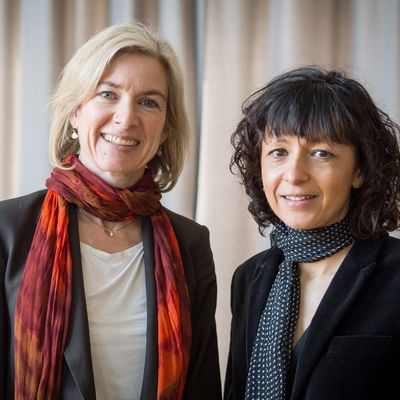
It’s October, and while this year that means observing new traditions, like the president and his circle of associates becoming a cesspool of viral transmission in a manner that could very easily have been avoided, it also means returning to old, more comforting ones, like the Nobel Prize season.
And in a spot of extra-nice news, this year’s Nobel Prize in Chemistry was jointly awarded to two women — Dr. Emmanuelle Charpentier and Dr. Jennifer A. Doudna — on Wednesday, for their groundbreaking work on genome editing. This is the first time a science Nobel has been awarded to two women, and only the third and fourth time a Nobel Prize in Chemistry has been bestowed upon a woman in the 21st century (of more than 50 past winners).
The award is in recognition of their 2012 research on Crispr-Cas9, a method of genome editing, that, per the New York Times, acts as “a kind of genetic scissors that allows researchers to alter DNA of animals, plants, and microorganisms with extremely high precision.” It’s been used to develop cures for genetic diseases and to modify crops, among other applications. Göran Hansson, the secretary-general of the Royal Swedish Academy of Sciences, said in his announcement of the new laureates, “This year’s prize is about rewriting the code of life.” This year’s prize money also rose to over $1.1 million.
Charpentier, a French scientist, is the director of the Max Planck Unit for the Science of Pathogens in Berlin, and Doudna, an American, is a professor at the University of California, Berkeley. Charpentier said that she hoped her and Doudna’s win “can provide a really strong message for young girls.”
Also this week, Dr. Andrea Ghez became only the fourth woman in history to win the Nobel Prize in Physics on Tuesday. She and two other astrophysicists, Dr. Roger Penrose and Dr. Reinhard Genzel, were recognized for their fascinating work on black holes. Genzel and Ghez’s decades of work in the field yielded evidence that there’s a supermassive black hole at the center of our galaxy. Valuable information for me to ponder as I go eat a pickle over the sink for breakfast.




